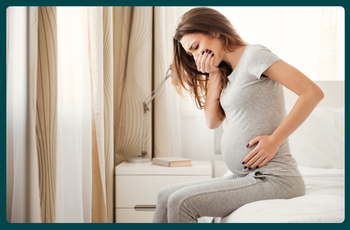Causes of lower abdomen discomfort or pain in the first trimester
During the first trimester, your body is adjusting to the hormonal changes and the implantation of the embryo. Some common causes of lower abdominal discomfort during this phase include:- Implantation cramps: As the fertilised egg attaches to the uterine wall, you may experience mild cramping sensations similar to menstrual cramps. This is a normal part of the implantation process.
- Stretching of the uterus: As the uterus begins to expand, the surrounding ligaments and muscles stretch, which can cause a dull ache or sharp twinges in the lower abdomen.
- Constipation: The increased levels of progesterone during pregnancy can slow down your digestive system, leading to constipation and discomfort in the lower abdomen.
Causes of lower abdomen discomfort or pain in the second trimester
As your pregnancy progresses into the second trimester, the causes of lower abdominal discomfort may change. Here are some common culprits:- Round ligament pain: The round ligaments, which support the uterus, stretch as the baby grows, causing sharp, stabbing pains or a dull ache in the lower abdomen, especially when changing positions or sneezing.
- Braxton-Hicks contractions: These are practice contractions that can cause tightening or discomfort in the lower abdomen. They are typically irregular and infrequent, and they help prepare your body for labour.
- Urinary tract infections (UTIs): Pregnant women are more susceptible to UTIs, which can cause pain or discomfort in the lower abdomen, along with a burning sensation during urination.
Causes of lower abdomen discomfort or pain in the third trimester
As you approach the final stretch of your pregnancy, the causes of lower abdominal discomfort may evolve further:- Increased pressure: As the baby grows larger, the added weight and pressure on your abdomen can cause discomfort or a dull ache in the lower region.
- Braxton-Hicks contractions: These practice contractions may become more frequent and intense as you near your due date, leading to tightening and discomfort in the lower abdomen.
- Pelvic girdle pain: The weight of the baby and the relaxation of ligaments in preparation for childbirth can cause pain in the pelvic area, which may radiate to the lower abdomen.
Home remedies for discomfort in lower abdomen in pregnancy
While discomfort in the lower abdomen is common during pregnancy, there are several home remedies that can provide relief:- Stay hydrated by drinking plenty of water and fluids.
- Practice gentle exercises like prenatal yoga or walking to improve circulation and alleviate discomfort.
- Apply a warm compress or take a warm bath to soothe muscle aches and cramps.
- Adjust your posture and avoid standing or sitting for prolonged periods.
- Try relaxation techniques like deep breathing exercises or meditation to manage stress and tension.
- Consult a telehealth doctor about safe over-the-counter pain relievers if the discomfort persists.
When to consult a doctor?
While mild discomfort in the lower abdomen is often normal during pregnancy, there are certain situations when you should seek medical attention:- If the pain is severe, persistent, or accompanied by bleeding, fever, or dizziness.
- If you experience regular, intense contractions before 37 weeks of pregnancy, as this could be a sign of preterm labour.
- If the pain is localised on one side of the abdomen, as this could indicate a more serious condition like an ectopic pregnancy or ovarian cyst.
- If you experience any unusual symptoms or have concerns about your well-being or the baby's health.
Can an online doctor help through telehealth appointment?
In today's digital age, telehealth appointments have become increasingly accessible and convenient. If you're experiencing discomfort in your lower abdomen during pregnancy and have concerns, an online doctor can provide valuable guidance and support. Through a secure video consultation, you can describe your symptoms, discuss your medical history, and receive professional advice from the comfort of your home. The online doctor can assess your situation, recommend appropriate remedies or self-care measures, and determine if an in-person examination is necessary. Telehealth appointments can be particularly helpful for expectant mothers who have mobility challenges, live in remote areas, or prefer the convenience of virtual consultations. However, it's important to note that for emergencies or severe symptoms, seeking immediate in-person medical attention is always recommended.Frequently Asked Questions
What signs should you not ignore during pregnancy?
While some discomfort is normal during pregnancy, there are certain signs that should not be ignored:- Severe or persistent abdominal pain
- Vaginal bleeding
- Decreased fatal movement
- Severe headaches or vision problems
- Persistent vomiting or inability to keep fluids down
What are the three normal pains of pregnancy?
The three most common types of normal pain experienced during pregnancy are:- Round ligament pain: Sharp, stabbing pains or a dull ache in the lower abdomen caused by the stretching of the round ligaments that support the uterus.
- Braxton-Hicks contractions: Irregular, mild contractions that help prepare the body for labour.
- Back pain: Caused by the added weight and strain on the back muscles as the pregnancy progresses.
What pregnancy pains shouldn't you ignore?
While some discomfort is expected during pregnancy, there are certain types of pain that should not be ignored:- Severe, persistent abdominal pain or cramping
- Pain accompanied by vaginal bleeding
- Intense, regular contractions before 37 weeks of pregnancy
- Severe headaches or vision problems
- Pain or burning during urination

Consult an Online Doctor in 15 mins










 Facebook
Facebook Instagram
Instagram LinkedIn
LinkedIn



